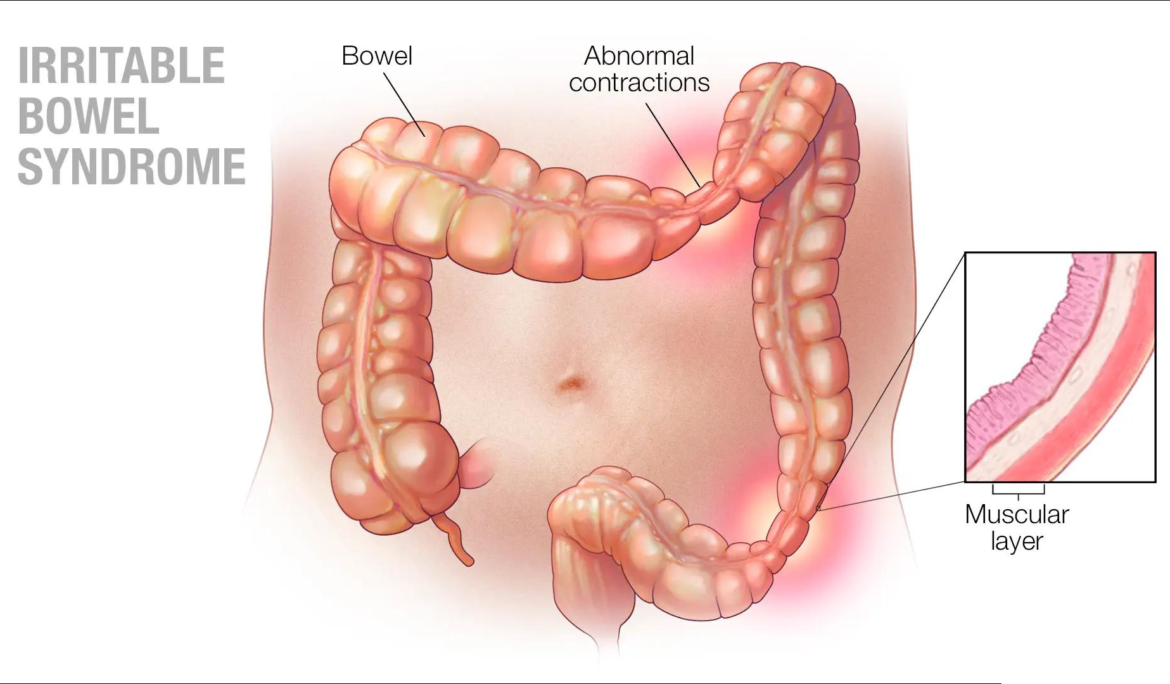Irritable bowel syndrome (IBS) causes uncomfortable or painful abdominal symptoms. Common symptoms include constipation, diarrhoea, gas, and bloating in addition to abdominal pain. Unlike other digestive issues, IBS doesn’t damage your digestive tract or increase your risk for colon cancer. Managing IBS is often possible through medications, diet, and lifestyle changes. Understanding and addressing these symptoms can improve your quality of life.
Types of IBS
Gastroenterology specialists can diagnose and classify IBS based on the appearance of your stools as diarrhoea-predominant (IBS-D), constipation-predominant (IBS-C) or mixed type. On some days, people with IBS have normal bowel movements, but on abnormal days, the type of IBS is defined by stool consistency.
- IBS with constipation (IBS-C): Most of your stools are hard and lumpy.
- IBS with diarrhoea (IBS-D): Most of your stools are loose and watery.
- IBS with mixed bowel habits (IBS-M): You experience both hard and lumpy stools and loose and watery stools.
The differences matter because certain treatments are effective only for specific types of IBS.
Symptoms
Symptoms of IBS can appear frequently or during flare-ups, meaning they don’t always occur. You might have normal bowel movements sometimes, and at other times, symptoms return. Common signs and symptoms of IBS include:
- Abdominal pain or cramps, (related to the urge to poop).
- Excess gas and bloating.
- Diarrhoea, constipation, or alternating between the two.
- Mucus in your poop, which may look whitish.
- Feeling like you cannot empty your bowels even after pooping.
Causes
The exact cause of IBS is unknown, but it is classified as a neuro gastrointestinal (GI) disorder. These conditions are also called disorders of the gut-brain interaction. These involve problems with how your gut and brain coordinate to help your digestive system work. These are some causes of IBS:
- Dysmotility: You may have problems with how your GI muscles contract and move food through your GI tract. The colon (large intestine) muscle contracts more when you have IBS. These contractions cause cramps and pain.
- Visceral hypersensitivity: You may have extra-sensitive nerves in your GI tract. People with IBS may have a lower pain tolerance. Plus, their digestive tract can be super sensitive to abdominal pain or discomfort.
- Gut bacteria: People with IBS may have altered bacteria in their GI tract. The types and amounts of gut bacteria are different in people with IBS compared to ones without this symptom.
- Severe infections: Some people get diagnosed with IBS after they get a severe infection in their GI tract. It suggests the role of germs.
- Food intolerance: Allergies to certain foods can also cause IBS.
- Childhood stress: IBS is common if people who had severe stressors in their childhood.
Diagnosis
Diagnosing IBS begins with a thorough medical history and your gastroenterology doctor in Delhi will inquire about your symptoms, including bowel movement patterns, changes in stool appearance, and any associated pain. They’ll also discuss your health, recent illnesses, medications, and stress levels. Since there isn’t a single definitive test for IBS, your provider may order various tests to rule out other conditions:
- Blood tests: These check for signs of infection or inflammation, ruling out conditions like inflammatory bowel disease (IBD).
- Stool tests: These detect infections or signs of inflammation in your digestive tract.
- Hydrogen breath test: This identifies bacterial overgrowth in your gut or potential food intolerances.
In addition to lab tests, imaging procedures may be recommended:
- Colonoscopy: A scope examines your entire colon to detect polyps, IBD, or cancerous growths.
- Flexible sigmoidoscopy: Similar to a colonoscopy but focuses on the rectum and lower colon.
- Upper endoscopy: Allows examination of the oesophagus, stomach, and duodenum to diagnose conditions like celiac disease.
Treatment
Treatment options for IBS vary, aiming to alleviate symptoms through lifestyle changes, dietary adjustments, medications, and therapeutic interventions.
Dietary Modifications
Adjusting your diet can significantly impact IBS symptoms:
- Increase fibre intake: Gradually add fruits, vegetables, grains, prunes, and nuts to prevent constipation.
- Use fibre supplements: Consider supplements to boost fibre intake.
- Limit dairy: Reduce lactose-containing products to alleviate bloating and gas.
- Avoid gas-inducing foods: Beans, Brussels sprouts, cabbage, carbonated drinks, and chewing gum can trigger symptoms.
- Gluten restriction: Some individuals benefit from a gluten-free diet, though it’s essential to ensure adequate nutrient intake.
- Low FODMAP diet: This plan reduces intake of fermentable carbohydrates to ease digestive distress.
- Hydration: Drink at least eight glasses of water daily to maintain gut health and prevent constipation.
- Food diary: Keep track of what you eat to identify triggers and adjust your diet accordingly.
Activity Modifications
Lifestyle changes can also contribute to symptom management:
- Regular exercise: Aim for 150 minutes of moderate exercise weekly to promote overall well-being.
- Relaxation techniques: Practice yoga, meditation, or seek therapy to reduce stress and calm the nervous system.
- Adequate sleep: Ensure seven to nine hours of quality sleep each night to support overall health and reduce stress.
Therapeutic Interventions
Therapy can help manage stress and associated conditions:
- Cognitive behavioural therapy (CBT): Effective in addressing anxiety and depression linked to IBS.
- Hypnotherapy: Utilised to alleviate symptoms through relaxation techniques.
- Biofeedback: Assists in gaining control over bodily functions affected by IBS.
Medications
Pharmacological treatments may be prescribed for symptom relief:
- Antidepressants: Tricyclic antidepressants (TCAs) and selective serotonin reuptake inhibitors (SSRIs) help manage pain and mood disorders.
- Antispasmodics: Medications like dicyclomine and hyoscyamine alleviate intestinal spasms.
- Laxatives and antidiarrheals: Used to regulate bowel movements.
- Probiotics: Beneficial bacteria that may alleviate symptoms, though research on their effectiveness is ongoing.
Closing Thoughts
There isn’t a cure for IBS. But, most people manage symptoms by avoiding triggers and taking medications when necessary. Since there’s no known cause for IBS, preventing or avoiding it is not possible. But if you have IBS, you can keep symptoms from flaring up by avoiding triggers.
Living with IBS requires understanding your body’s responses and making adjustments to your diet and lifestyle. By working closely with your Gastroenterology doctor in Delhi, you can identify triggers and find effective treatment options to alleviate symptoms.
If you are looking for a trusted gastroenterology specialist, Dr Rohit Goyal has been helping patients for years, and can help you manage your IBS symptoms. Get in touch with him today for specialised care.













